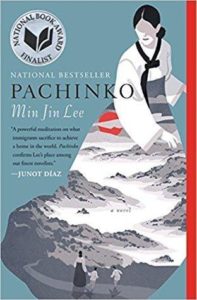In 2017, the Korean-American author Min Jin Lee published her novel, Pachinko. Now, five years later, the book is widely read in high schools, colleges and universities. At the same time, Min Jin Lee—born in Seoul, Korea and raised in a blue-collar neighborhood of Queens, New York—has achieved international acclaim.
Yet, the success of Pachinko and the author’s rise to literary fame are not entirely accidental. In literature as in life, timing is everything. Lee’s novel Pachinko arrived at a pivotal moment for Korean culture globally. The Netflix blockbuster Squid Game, made in South Korea, is one of the most watched series in Netflix history. The popularity of Squid Game reflects the growing international prominence of South Korean culture in the past decade. This trend is evident in the growing audiences for Korean soap operas (K-dramas), K-Pop music, and Korean cinema. When the subtitled South Korean movie, Parasite, won the Oscar for best film in 2020, one observer noted that “Korean films, dramas, and music have taken over the globe.”
Pachinko also succeeds because it opens a window on little known historical events, time periods that have slipped past us, and places that we’ve always wanted to visit, but will likely never reach. And even if we do travel in Japan, the inner workings of Japanese society described by Min Jin Lee may very well escape our scrutiny.
In Pachinko, Lee chronicles the lives of four generations of an ethnic Korean family, first in Japanese occupied Korea in the early twentieth century, then in Japan from the years before World War II to the late 1980s. Drawing on newspaper accounts and interviews she conducted while living in Japan as an adult for four years, Lee depicts the harsh treatment of Koreans in Japan and the discrimination that Koreans in Japan face in employment, housing, and education. The first line of Pachinko sets the stage for this sweeping tale of family struggle and resilience: “History has failed us. But no matter.”
Emotional authenticity is at the core of Pachinko. Lee abandoned the first draft of the novel, afraid that her characters sounded stale. They were chiefly defined by their suffering. However, “the Koreans in Japan didn’t see themselves as victims,” Lee explains in an interview. “They were so tough that I felt foolish for having pitied them. The things that happened in history were horrid, but the Korean-Japanese I talked to weren’t waiting for an apology…They’ve moved on and adapted.”
Lee titles her novel Pachinko to underscore the adaptability of Koreans in Japan. Pachinko, a cross between pinball and a slot machine, is not only an extraordinarily popular game in Japan, generating billions of dollars in business. Pachinko parlors also provide one of the few ways for Koreans to climb the social ladder and gain financial security. As in the novel, Koreans in Japan often begin working in pachinko parlors and later become managers or owners of these parlors. The characters in Pachinko know that the game is rigged, but they believe that there is always room for randomness and hope.
So, too, Min Jin Lee’s success as a novelist demonstrates that it’s worthwhile to take the gamble and play the game. Readers will be glad she did.
